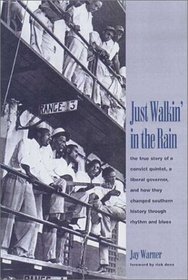Search -
Just Walkin' in the Rain: The True Story of the Prisonaires: the Convict Pioneers of R & B and Rock & Roll
Just Walkin' in the Rain The True Story of the Prisonaires the Convict Pioneers of R B and Rock Roll
Author:
The history of rock'n'roll and rhythm and blues is filled with inspiring characters.But no story in popular music is more poignant and more triumphant than that of Johnny Bragg and his all-convict singing group, the Prisonaires.As a teenager in the mid-1940s, Bragg was sentenced to six life terms in the Tennessee State Prison.His only pleasure, ... more »
Author:
The history of rock'n'roll and rhythm and blues is filled with inspiring characters.But no story in popular music is more poignant and more triumphant than that of Johnny Bragg and his all-convict singing group, the Prisonaires.As a teenager in the mid-1940s, Bragg was sentenced to six life terms in the Tennessee State Prison.His only pleasure, ... more »
ISBN-13: 9781580631402
ISBN-10: 1580631401
Publication Date: 2/2001
Pages: 256
Rating: 1
ISBN-10: 1580631401
Publication Date: 2/2001
Pages: 256
Rating: 1
5 stars, based on 1 rating
Genres:
- Biographies & Memoirs >> Arts & Literature >> Entertainers
- Humor & Entertainment >> Music >> General
- Humor & Entertainment >> Music >> History & Criticism
- Humor & Entertainment >> Music >> Musical Genres >> Rhythm & Blues
- Humor & Entertainment >> Music >> Musical Genres >> Rock
- Humor & Entertainment >> Music >> Musical Genres >> R&B & Soul




